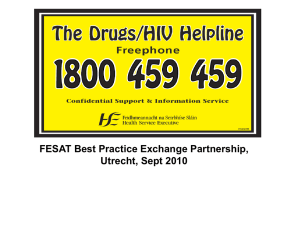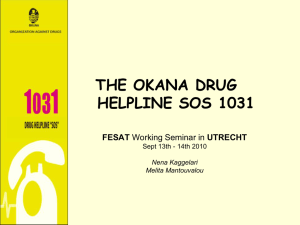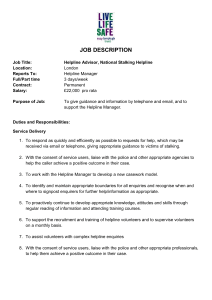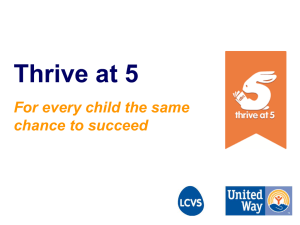Brain Injury Basics for Families in NJ (PowerPoint)
advertisement
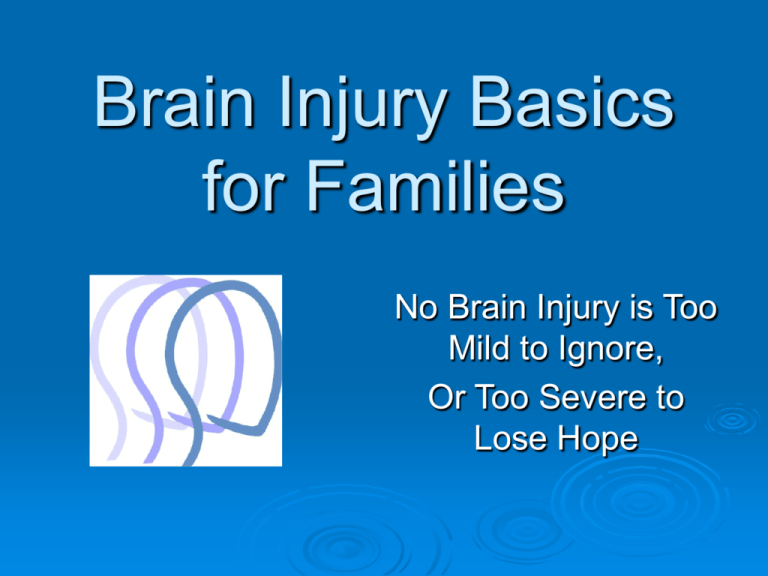
Brain Injury Basics for Families No Brain Injury is Too Mild to Ignore, Or Too Severe to Lose Hope What is brain injury? Brain injury is often defined as either a Traumatic Brain Injury (TBI) OR Acquired Brain Injury (ABI) Family Helpline: 1-800-669-4323 Traumatic Brain Injury Traumatic Brain Injury (TBI) is an insult to the brain caused by an external force that may produce a diminished or altered state of consciousness. Causes of TBI can include motor vehicle crashes, falls, sports injuries, assaults, blast injuries. Family Helpline: 1-800-669-4323 Acquired Brain Injury Acquired Brain Injury (ABI) is an injury to the brain which is not hereditary, congenital or degenerative and has occurred after birth. Causes of ABI include anoxia, aneurysms, infections to the brain, stroke, brain tumors. Family Helpline: 1-800-669-4323 “The Silent Epidemic” It is estimated that 5.3 million Americans live with a disability as a result of brain injury. Family Helpline: 1-800-669-4323 TBI in the United States 50,000 Deaths Average annual numbers, 1995-2000 235,000 Hospitalizations 1,111,000 Emergency Department Visits ?? Receiving Other Medical Care or No Care ?? From the 2004 CDC Report: TBI in the United Sates: ED Visits, Hospitalizations and Deaths Family Helpline: 1-800-669-4323 Traumatic Brain Injury in New Jersey Approximately 8,000 adults and children each year are hospitalized or die as a result of a traumatic brain injury. than 20,000 people are treated each year in doctor offices or emergency rooms for TBI.* More * Conservatively extrapolated from national data Family Helpline: 1-800-669-4323 Traumatic & Acquired Brain Injury in New Jersey Although the cause of injury differs, many programs and services for people with brain injury serve both TBI & ABI. For example, the TBI Medicaid Waiver & TBI Fund both serve individuals with TBI & ABI. Family Helpline: 1-800-669-4323 Changes Over the Years 30 years ago – 50% of persons with a brain injury died as a result of the injury. Today – 22% die as a result of injury. Family Helpline: 1-800-669-4323 Functions of the Brain The best way to understand the affect of injury to the brain is to understand the function of each area of the brain and related systems and structures. Family Helpline: 1-800-669-4323 Brain Stem The brain stem, located at the base of the skull, is responsible for life-sustaining functions such as regulation of blood pressure, heart rate, breathing and body temperature. Damage to the brain stem could result in an altered state of consciousness, such as coma. Family Helpline: 1-800-669-4323 Cerebellum The cerebellum, located behind the brain stem, is responsible for muscle coordination and balance. Family Helpline: 1-800-669-4323 Occipital Lobe The occipital lobes, located at the back of your brain, is the visual processing center in the brain. Damage to these areas may result in neurological visual impairment. Family Helpline: 1-800-669-4323 Temporal Lobes The temporal lobes lie at the sides of the brain and are the auditory (hearing) processing system of the brain. Family Helpline: 1-800-669-4323 Parietal Lobes The parietal lobes, located above your occipital lobes, controls the way your brain responds to information it receives, including visual, auditory and physical information. For example, being touched, loud noises, bright lights. Family Helpline: 1-800-669-4323 Frontal Lobes The frontal lobes, located in the front of your brain, control the processes of planning, organization, problem solving, reasoning, emotions and motor skills. Family Helpline: 1-800-669-4323 Severity of Injury Sometimes, a brain injury is categorized in one of the following three ways: Mild Brain Injury Moderate Brain Injury Severe Brain Injury. Family Helpline: 1-800-669-4323 Mild Brain Injury Not Just A Bump On The Head! Loss of consciousness does not have to occur— the person may be dazed or confused If loss of consciousness occurs, it is very brief, usually a few seconds or minutes A concussion is considered a mild brain injury Testing or scans of the brain may appear normal Family Helpline: 1-800-669-4323 Moderate Brain Injury A loss of consciousness lasts from a few minutes to a few hours Confusion lasts from days to weeks Physical, cognitive, and/or behavioral impairments last for months or are permanent. Family Helpline: 1-800-669-4323 Severe Brain Injury Severe brain injury occurs when a prolonged unconscious state or coma lasts days, weeks, or months. Persons who sustain a severe brain injury can make significant improvements, but are often left with permanent physical, cognitive, or behavioral impairments. Family Helpline: 1-800-669-4323 Severity of Injury Severity of injury does not guarantee outcome. Persons who sustain a mild brain injury may have ongoing difficulties for years to come and persons with a severe brain injury may make marked improvements over time. Every brain injury is unique. Family Helpline: 1-800-669-4323 Brain Injury & Families Just as each brain injury is unique, brain injury will affect each family differently. Brain injury often changes the roles and responsibilities of family members. The change can be so drastic it can be similar to bringing a stranger home from the hospital with you. Family Helpline: 1-800-669-4323 Parental Relationships Parents of children, adolescents, and adults with brain injury may become lifelong caregivers of their sons and daughters. Family Helpline: 1-800-669-4323 Sibling Relationships Siblings live with the consequences of having a sibling with a disability. They may receive less attention from parents and may take on a lifelong responsibility of worrying and caregiving. Family Helpline: 1-800-669-4323 Spousal Relationships A spouse’s relationship may shift mildly or drastically from one of partner to one of caregiver. Family Helpline: 1-800-669-4323 Child-Parent Relationships The child of a parent with a brain injury may experience a role reversal. They may end up caring for their parent early in their lives, and receive less attention from the parent providing caregiving. Family Helpline: 1-800-669-4323 Grief & Loss for the Individual Potential loss of identity, self-esteem, self-control, expression/communication, independence, relationships, mobility, vocational/career identity, productivity, income and assets. Family Helpline: 1-800-669-4323 Grief & Loss for the Family Potential change in relationships, dreams for loved one, responsibilities as caregiver, personal freedom, lifestyle, income and assets. Family Helpline: 1-800-669-4323 Stages of Grief There are several stages of grief that are common following a brain injury that both people with brain injury and family members go through. Family Helpline: 1-800-669-4323 Stages of Grief Denial Anger Bargaining Depression Acceptance Family Helpline: 1-800-669-4323 Denial After a terrible experience, a person may act as if it did not happen. “This could not have happened to me.” “She’ll be her old self again soon.” Family Helpline: 1-800-669-4323 Anger Once the person accepts that the event occurred, anger and frustration are the next emotions. The anger can be directed at doctors, family, friends, God, and even at self. “The doctor doesn’t know anything.” “No one is helpful.” Family Helpline: 1-800-669-4323 Bargaining Trying to make deals. “I’ll be a perfect person if my son is able to be normal again.” “I will never do ____ again if you let me return to my old self.” Family Helpline: 1-800-669-4323 Depression This is a very difficult and painful stage of recovery for both people with brain injury and family members. “What’s the use? Nothing will ever be the same again.” “Why bother with rehab?” Family Helpline: 1-800-669-4323 Acceptance As time passes, individuals and families can come to accept the changes that have taken place. Nothing can make life as it was before, but life can be new and worthwhile. Family Helpline: 1-800-669-4323 Living With Brain Injury Brain injury will affect each individual differently, but there are many common consequences. The following consequences and strategies are offered to help both you and your loved one cope with brain injury. Family Helpline: 1-800-669-4323 Cognitive Consequences Difficulty with... Memory Persistence Decision making Organization Planning Self-perception Attention Thinking Problem solving Sequencing Perception Judgment Inflexibility Processing speed Concentration Family Helpline: 1-800-669-4323 Physical Consequences Seizures Muscle spasticity Fatigue Headaches Balance problems Speech difficulties Visual difficulties Hemiparesis (paralysis) Family Helpline: 1-800-669-4323 Emotional/Behavioral Consequences Anxiety Depression Mood swings Impulsivity Irritability Social withdrawal Aggression Lack of motivation Egocentric behaviors Lack of self-awareness Inappropriate behavior and/or language Sexual dysfunction Feelings of loneliness Family Helpline: 1-800-669-4323 Strategies for Living with Brain Injury One of the most important things family members can do is establish structure, consistency, and repetition in their family members routine. Family Helpline: 1-800-669-4323 Structure, Consistency & Repetition Establish a schedule. Keep your family member’s environment organized. Utilize calendars, notebooks, wall charts, and visual aids as reminders, but be careful not to overstimulate with too much information. Family Helpline: 1-800-669-4323 Structure, Consistency & Repetition Remain consistent in what you do and what your expectations are (for example, always remaining a model of calm behavior during outbursts) Repetition will provide a feeling of safety, and be the key to new learning for your family member. Family Helpline: 1-800-669-4323 Breaking Down Tasks It is always best to break tasks into steps, whether it be completing paperwork for Social Security Disability or preparing a meal. Expecting large projects to be completed all at once will be setting your family member and yourself up for failure. Family Helpline: 1-800-669-4323 Minimizing Distractions Providing as much of a distraction free environment as possible will minimize overstimulation and cognitive overload. Family Helpline: 1-800-669-4323 Anticipating Stressful Events Anticipate situations that may be stressful for your family members, and try to avoid or minimize the stress. For example, large family gatherings could be overwhelming and trips to the store when they are crowded and noisy could be cognitively overwhelming. Family Helpline: 1-800-669-4323 Watch for Depression Signs of depression to watch for include: Changes in eating habits Changes in sleeping habits Remarks about the futility of life Dwelling on the past Excessive time spent in non-active ways like watching too much television Family Helpline: 1-800-669-4323 Behavioral Challenges An estimated 90% of all people who are severely disabled by a brain injury may experience some related emotional, behavioral or psychiatric problems. 40% of these individuals still have behavioral issues 5 years after the injury.* *Brain Injury Association of America Family Helpline: 1-800-669-4323 Behavioral Challenges Individuals with milder brain injuries can also experience behavioral challenges, including mood changes, irritability and fatigue, which might be more difficult to identify as being related to the brain injury. Family Helpline: 1-800-669-4323 Behavioral Challenges Behavioral challenges can range from mild personality changes to persistent difficulty controlling emotions, lack of inhibition, managing one’s behavior, and even violent outbursts. Family Helpline: 1-800-669-4323 Behavioral Challenges Behavioral problems can cause: Marital discord Problems with social relationships Family difficulties School or workplace problems And should never be ignored Family Helpline: 1-800-669-4323 Behavioral Challenges There are professionals who can assist with behavioral problems, including: Neuropsychologists: expertise in assessing the relationships between the brain, behavior and cognition Neuropsychiatrists: can prescribe medications that affect mood, thinking and behavior Family Helpline: 1-800-669-4323 Behavioral Challenges: Tips for Families Identify stress relievers (taking deep breaths, removing the person from the aggravating environment) Learn to recognize when behaviors will occur (when someone is tired, ill, overwhelmed) Family Helpline: 1-800-669-4323 Behavioral Challenges: Tips for Families Identify specific triggers or events (changes in routine, dealing with difficult tasks or people) Identify triggers that your family member is becoming upset (facial expressions, body language) Family Helpline: 1-800-669-4323 Behavioral Challenges: Tips for Families Identify a plan for when behaviors happen – having a plan will help to ease your stress, as well as your family member’s stress Know when to seek the help of a professional – you don’t have to do it all yourself Family Helpline: 1-800-669-4323 Behavioral Challenges: Things to Remember Remain involved in activities to avoid social isolation Allow for independence Coach, encourage and reinforce positive behavior Understand the person may be doing their best to control the behavior Family Helpline: 1-800-669-4323 Support Systems Develop a support system for your family member, and avoid social isolation. This could include family, friends, support groups, a mentor, a local church group, social and recreational groups in the community, your local Independent Living Center. Family Helpline: 1-800-669-4323 Getting Involved Daily activities like returning to work, volunteering, taking a class, and participating in community activities will not only provide a structured routine, but will also increase your family member’s self-esteem and avoid social isolation. Family Helpline: 1-800-669-4323 Independence “Family members or caregivers should let the recovering TBI survivor burn dinner every night if necessary but step in if the house is burning down.” – Claudia Osborn Be cautious that caregiving allows for the opportunity to be independent and make mistakes. Family Helpline: 1-800-669-4323 Things to Remember Every individual is different, and every injury is unique. Get to know your family member’s abilities, not just their limitations. Listen to your family member. Treat them in an age appropriate manner. Family Helpline: 1-800-669-4323 Things to Remember Everyone needs to have control over their own life. Without such control, dissatisfaction, frustration, resentment and depression are likely to occur. Family Helpline: 1-800-669-4323 Tips for Caregivers Take care of yourself, you will need to sleep and eat to maintain your strength and wellbeing. Family Helpline: 1-800-669-4323 Tips for Caregivers Delegate responsibilities like household chores, staying with your loved one, running errands. Friends and family often want to help, but don’t know what to do. Family Helpline: 1-800-669-4323 Emotional Support Make sure you have someone to express your emotions to, accompany you to appointments, have fun with. You do not always have to be strong and you can accept help. Utilize friends, family, advocates to support you and your loved one. Family Helpline: 1-800-669-4323 Become an Advocate Learn about brain injury, question the rehabilitation team, be involved, obtain articles, books, and videos to help you learn. You will often have to educate those around you about brain injury. Being an advocate and asking for help will ease this burden. Family Helpline: 1-800-669-4323 Brain Injury Association of New Jersey Founded in 1981 by family members and friends of persons with brain injury, the Brain Injury Association of New Jersey is a statewide membership organization dedicated to providing education, outreach, prevention, advocacy and support services to all persons affected by brain injury and to the general public. Family Helpline: 1-800-669-4323 BIANJ Programs & Resources Information & Resources Helpline 1-800-669-4323 732-738-1002 Info@bianj.org Family Helpline: 1-800-669-4323 BIANJ Programs & Resources Brain Injury Resource Center Free Publications Articles on brain injury and disability related topics Browse & Borrow Book & Video Library Family Helpline: 1-800-669-4323 BIANJ Programs & Resources Support Groups 16 affiliated groups throughout the state for people with brain injury and their families Family Helpline: 1-800-669-4323 BIANJ Programs & Resources Mentoring Matching trained mentors with people with brain injury and family members in need of support Family Helpline: 1-800-669-4323 BIANJ Programs & Resources Family Support For eligible individuals, injured before the age of 22 and registered with the Division of Developmental Disabilities, care coordination services to assist them and their families in finding and obtaining the supports and services they need. Family Helpline: 1-800-669-4323 BIANJ Programs & Resources TREK Together in Recreation, Exploration & Knowledge A week of summer respite for individuals 16 and older at Camp Ockanickon in Burlington County. Family Helpline: 1-800-669-4323 BIANJ Programs & Resources Annual Seminar A two-day seminar providing people with brain injury, their families, and the professionals working with them education about new brain injury issues and topics, and an opportunity to meet with one another. Family Helpline: 1-800-669-4323 BIANJ Programs & Resources Regional Trainings Every spring, the Association holds full-day regional trainings on brain injury for health & human service workers in the northern, central & southern regions of the state. Families are encouraged to let the health & human service workers that assist them know about this unique opportunity to learn about brain injury. Family Helpline: 1-800-669-4323 BIANJ Programs & Resources Membership In becoming a member of the Association, families will be kept apprised of important events and issues related to brain injury through our quarterly newsletter, Annual Meeting, and BIANJ event mailings. Family Helpline: 1-800-669-4323 BIANJ Programs & Resources Staying in Touch E-News: The Association’s monthly electronic newsletter. Leg-Net: The Association’s e-mail network to learn about important legislative issues. Website: Updated regularly with important news & events. Family Helpline: 1-800-669-4323 BIANJ Programs & Resources The Association also works to raise awareness of brain injury and its preventability through a number of additional programs and initiatives. Family Helpline: 1-800-669-4323 Additional Resources The following are just a few of the resources available. For further information & resources, contact an Information & Resources Specialist at the Association’s Helpline at 1-800-669-4323. Family Helpline: 1-800-669-4323 Additional Resources Traumatic Brain Injury Specialized Care Units New Jersey Medicaid has authorized some long term care facilities to provide specialized care to certain nursing home residents with exceptional needs, including brain injury. Pre Admission Screening by Medicaid is required for these programs. Medicaid: 1-800-356-1561 Family Helpline: 1-800-669-4323 Additional Resources Division of Disability Services (DDS) This state office provides information and referral services to people with disabilities and their families, who are seeking help locating appropriate resources in their communities. The Division also is responsible for overseeing various Medicaid home-and community-based waiver programs that are designed to help people with disabilities live as independently as possible. 1-888-285-3036 Family Helpline: 1-800-669-4323 Additional Resources Traumatic Brain Injury (TBI) Fund As a payer of last resort, providing individuals with the supports and services they need. Administered through the Division of Disability Services. 1-888-285-3036 Family Helpline: 1-800-669-4323 Additional Resources Traumatic Brain Injury (TBI) Medicaid Waiver Developed as an alternative to nursing homes for people with brain injury ages 22-65, with an injury occurring after an individual’s 21st birthday. Administered through the Division of Disability Services. 1-888-285-3036 Family Helpline: 1-800-669-4323 Additional Resources Division of Developmental Disabilities (DDD) For individuals whose disability manifested before age 22 and resulted in lifelong conditions that affect a person’s ability to live independently, this state agency arranges and coordinates services to eligible state residents. (609)-292-3742 Family Helpline: 1-800-669-4323 Additional Resources Additional Medicaid Waivers exist to assist people with disabilities, including: Community Resources for People with Disabilities (CRPD) Waiver Community Care Waiver (CCW) Medicaid Waiver for the Elderly & Disabled to Provide Enhanced Community Options (ECO) Waiver Community Care Program for the Elderly & Disabled (CCPED) Waiver Family Helpline: 1-800-669-4323 Additional Resources Division of Vocational Rehabilitation Services (DVRS) Provides services to individuals of employable age with disabilities through 18 district offices. (609)-292-2000 Family Helpline: 1-800-669-4323 Additional Resources Social Security Disability Insurance (SSDI) Benefits for individuals who have enough Social Security credits and who have a severe physical or mental impairment. AND Supplemental Security Income (SSI) A Federal program established for the aged and people with disabilities who have a low income and few assets. 1-800-772-1213 Family Helpline: 1-800-669-4323 Additional Resources Board of Social Services County offices that provide services including food stamps, general assistance, emergency assistance, Medicaid, and support services to people with disabilities. Family Helpline: 1-800-669-4323 Additional Resources Independent Living Centers Community-based, consumer driven organizations for people with disabilities. Family Helpline: 1-800-669-4323 Additional Resources County Offices for the Disabled A clearinghouse for information about programs and services for people with disabilities at a local level. Family Helpline: 1-800-669-4323 Additional Resources 2-1-1 An easy-to-remember telephone number that connects callers to the health and human services, community resources and government assistance they need. Available 24/7. Easily accessed by any landline or cell phone. Calls are free and confidential. Multi-lingual/TTY/TTD. Certified Call Specialists make appropriate referrals and monitor outcomes to ensure services are provided. Family Helpline: 1-800-669-4323 Brain Injury Association of New Jersey, Inc. 1-800-669-4323 (732)-738-1002 www.bianj.org Info@bianj.org
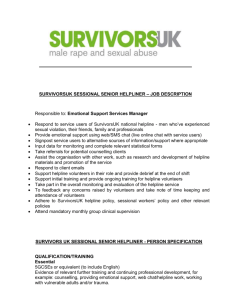
![Extreme Weather Conditions - Preventative Measures [doc / 272KB]](http://s3.studylib.net/store/data/007256003_1-f08a5267d9e865d85ddea6fe14d19a26-300x300.png)
